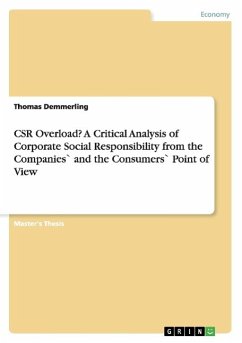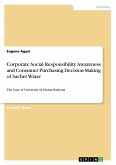Master's Thesis from the year 2013 in the subject Business economics - Business Ethics, Corporate Ethics, grade: 1,5, University of applied sciences Dortmund, course: BWL - Unternehmensethik, Wirtschaftsethik, Marketing, language: English, abstract: The term and concept of "Corporate Social Responsibility" (CSR), which generally means that companies' voluntarily takeover responsibility for different social, economic, ecological, and culture issues, has gained such popularity among academics and the popular media that it seems to be ubiquitous nowadays. More recent incidents and scandals such as "Nestle - Powder Milk", "Shell - Brent Spar", "Enron", "Parmalat", Sweatshops by different sports equipment and electronic devices producers and finally the financial crisis which made the headlines among many others, which did not make it to the front page, have forced companies to consider CSR even more. But also other issues such as climate change and global warming, human rights situation and terrorism affect how companies conduct their strategies and operational practices today. It is observable that almost every large corporation makes some effort to communicate how it is committed to social issues that lie beyond its basic profit objectives. A short look at the websites is enough to notice that companies of many different industry sectors make much effort to present their corporate responsibility initiatives. The companies produce healthier food more fuel-efficient vehicles and save resources in their operations to make the world "a better place". In view of this, CSR sometimes begins to be propaganda to hide the true face of the business. Corporate social responsibility is now a key-marketing and branding instrument for many companies. Hence, numerous other companies, also small and medium sized companies are currently asking themselves the questions: Shall we also invest in CSR initiatives? Why should we do that - just to do something? Is this still an instrument to gain a competitive advantage? Especially the last question implies the question, if consumers still believe in the basic idea of CSR initiatives, or with the overload of CSR initiatives, if they even show reactance and mistrust against such issues. The present work will answer these questions from the compannies and the consumers point of view.
Bitte wählen Sie Ihr Anliegen aus.
Rechnungen
Retourenschein anfordern
Bestellstatus
Storno








